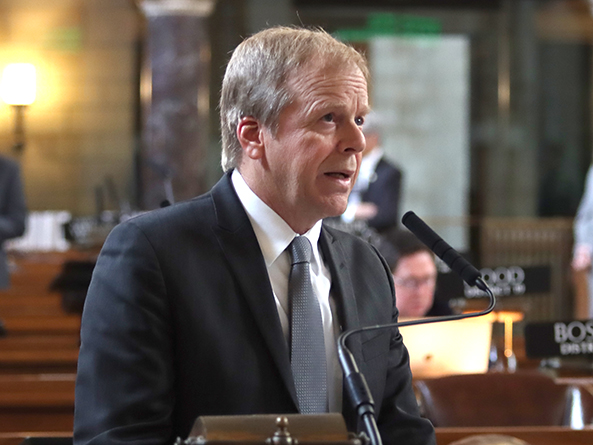Session Review: General Affairs
Casino gaming regulations and the distribution rights of craft breweries topped the list of issues considered by the General Affairs Committee this session.
Lawmakers updated horse racetrack casinos regulation this session with LB876, introduced by Albion Sen. Tom Briese.
The bill changes several provisions of the Nebraska Racetrack Gaming Act, including increasing a number of penalties and raising the operator’s license fee from $1 million to $5 million.
An existing racetrack may apply to move to another county in Nebraska that does not have a racetrack subject to State Racing and Gaming Commission approval.
The bill also prohibits issuance of new licenses until the commission conducts a statewide horse racing market analysis, a study of the potential casino gaming market and a socioeconomic impact study of horse racing and casino gaming statewide and in each county that has a licensed racetrack. The three studies must be completed by Jan. 1, 2025.
Among other provisions, LB876 increases the duration of a horse racing license from one to five years and requires existing tracks to hold at least five racing days and 50 live races annually by Jan. 1, 2026, and 15 racing days and 120 races annually by Jan. 1, 2031.
The measure also includes provisions of Briese’s LB877, which require the State Racing and Gaming Commission to meet at least eight days each year and requires racetracks to pay the commission an increasing percentage of proceeds. Beginning July 1, 2023, the amount will increase to 1 percent of the gross sum of parimutuel wagers placed at the track during the previous calendar year and rise to 2 percent annually on July 1, 2024.
LB876 passed on a 38-3 vote and took effect immediately.
Two additional gaming proposals did not advance from committee.
LB923, introduced by Sen. John Cavanaugh of Omaha, would have allowed individuals to play keno digitally while at a licensed lottery operator in Nebraska and LB1268, sponsored by Lincoln Sen. Eliot Bostar, would have allowed the Nebraska Lottery to sell tickets through vending machines.
Nebraska craft breweries were granted limited self-distribution rights under LB1236, sponsored by Kearney Sen. John Lowe. The bill allows a craft brewer to directly sell up to 250 barrels — equivalent to 82,500 12-ounce bottles or cans — of their own manufactured beer each calendar year if the licensee:
• self-distributes its beer only in a territory in which the licensee does not have a distribution agreement with a licensed wholesaler;
• uses only persons exclusively and solely employed by the licensee to distribute its beer in vehicles exclusively and solely owned or leased by the licensee; and
• complies with all relevant statutes, rules and regulations that apply to Nebraska beer wholesalers regarding beer distribution.
A craft brewery licensee may self-distribute beer brewed at its own licensed premises and cannot distribute beer produced by any other licensee.
The bill contains provisions of two other proposals introduced by Lowe.
LB899 creates a new special designated license for nonprofits that are exempt from federal income taxes. The provisions allow groups of nonprofits to use one application for up to six SDLs as long as each event is held at the same location.
LB900 allows Nebraska microdistilleries — entities that make their own whiskey, gin and other spirits — to operate up to five separate physical locations under one license.
Senators passed the measure on a 46-0 vote.


